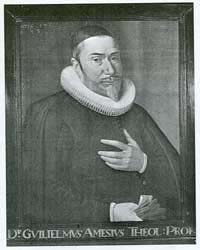William Ames (1576-1633)

Prominent Puritan preacher and theologian of England and the Netherlands. Educated at Christ's College, Cambridge (B.A. 1598, M.A. 1601), he stayed on to become a fellow and teacher of Christ's. As a student he was converted by the Puritan preaching of William Perkins, and throughout his life he associated himself with the more extreme Puritans. In 1610 Ames was expelled from Cambridge because of his Puritanism, and thereafter his career was destroyed in England.
Ames took refuge in the Netherlands, joining the large English-Scottish refugee community. During his immigrant years he served first as a military chaplain and then as professor of theology at the University of Franeker (1622-33), where he earned a doctor of theology degree. He was a strong Calvinist and opposed the Arminians, which reputation drew him to the Synod of Dort (1618-19) as an adviser to the Synod president. He died at Rotterdam.
He was often known as "the Learned Doctor Ames" because of his great intellectual stature among Puritans. As a Puritan intellectual he combined Calvinist doctrine, Ramist philosophy (from Peter Ramus), and Puritan practical divinity. His best known books are The Marrow of Sacred Divinity (1627, in Latin and English), and Conscience, or Cases of Conscience (1630, also in Latin and English). Both went through many seventeenth century editions, and the Marrow has been reprinted as recently as 1968. He wrote many books against Dutch Arminianism and against the episcopal system in England.
Ames stressed that theology must combine orthodox doctrine, which he defined as Calvinistic, and moral practice. Theology divides into a Ramist dichotomy: faith and observance. In church practices he experimented with new ideas. He believed in independent, voluntary congregations, but not separatism. He was one of the founders of the Congregationalist movement among Puritans. Just before his death he had accepted a call to become copastor with Hugh Peter of the English church of Rotterdam. This church was one of the earliest Congregationalist churches (1632). Ames enjoyed a great reputation among Nonconformist English Puritans and among the Puritans of New England. Cotton Mather of Boston called him "that profound, that sublime, that subtil, that irrefragable, yea that angelical doctor."
- K. L. SPRUNGER
http://upload.wikimedia.org/wikipedia/en/d/d5/DrAmes.jpg
By Scripture
Old Testament
